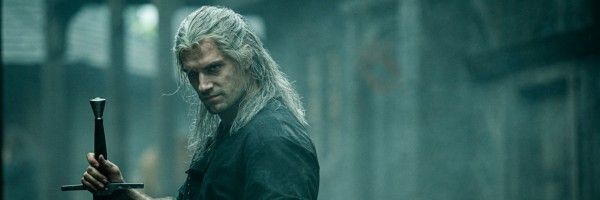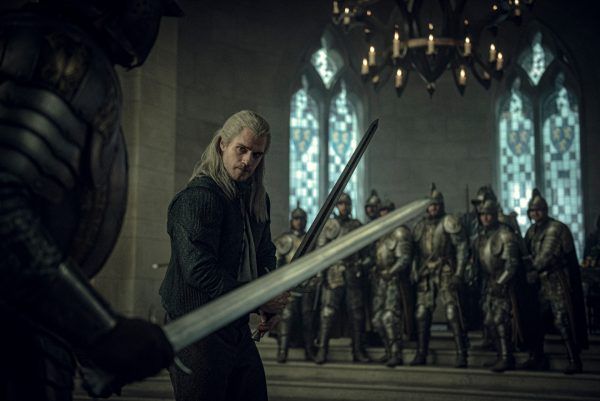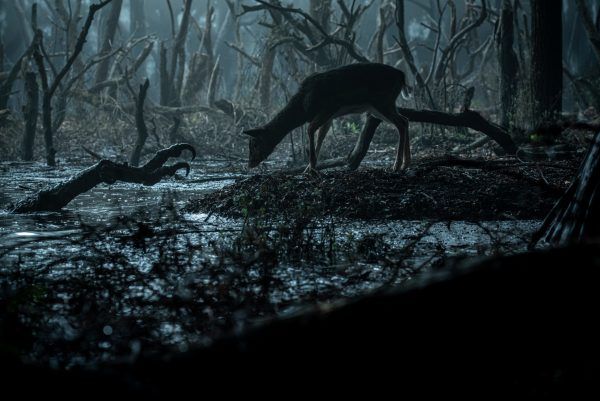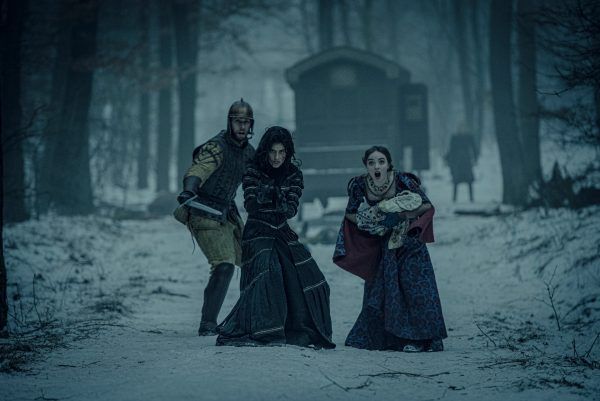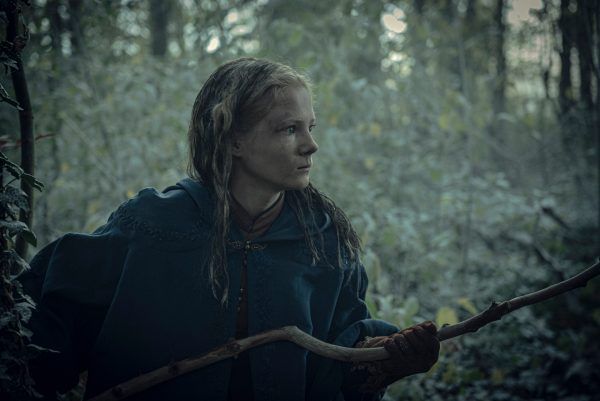The Witcher, Netflix’s highly anticipated adaptation of the popular fantasy series by Polish author Andrzej Sapkowski, seems prepared for the inevitable Game of Thrones comparisons and is leaning heavily into them. There’s political intrigue. There’s gratuitous nudity. There’s graphic violence. But The Witcher has the added benefit of being loaded with monsters and elves and magic from jump street. Seriously, there is casual sorcery and gigantic swamp spiders all over the place. This is high fantasy for adults, and believe me, I know how that sounds. But The Witcher is well-constructed, well acted, and refreshingly straightforward in its storytelling, spinning an epic fantasy yarn full of familiar fantasy tropes blanketed by grim European folklore that casts a shadow on all the familiarity like a particularly sinister set of blackout curtains.
The show takes place on the Continent, a vaguely European medieval land not unlike Tolkien’s Middle Earth, if the Hobbits had their wellwater poisoned by the leering scumbaggery of George R. R. Martin’s Westeros. Like Westeros, it’s made up of several kingdoms that seem to always be teetering on the precipice of all-out war, like a bunch of adult kickball teams getting too drunk at bar trivia night. Complicating all this tension is the fact that the Continent is just lousy with monsters, which is where Witchers come in. Witchers are monster hunters, humans that have been mutated by magic to have enhanced abilities. Geralt of Rivia (Henry Cavill), the only handsome Witcher to have ever existed, is just trying to make is way through the Continent plying his trade and minding his business, but winds up getting entangled in human conflicts more than he’d care to.
Meanwhile, war finally explodes between the nations of Nilfgaard and Cintra, forcing Princess Ciri of Cintra (Freya Allan) to go on the run through the Continent’s dangerous warzones and enchanted forests to avoid getting captured by the Nilfgaardian’s commander, whose single-minded pursuit suggests he’s got some kind of nefarious plan for her up his sleeve. And in another part of the Continent, a deformed peasant named Yennefer (Anya Chalorta) is taken in by a mysterious order of mages and forced to train under a cruel rectress to learn how to control magic.
Right off the bat, The Witcher is an impressive offering. The scale of the show is massive, and Netflix has put enough resources into its production that everything looks quite good. Every interior, from a random village tavern to a grand castle hall to the solarium of a magic tower, is convincingly detailed and effectively staged. Battle scenes feature what seems like hundreds of extras. Shot mostly in Eastern Europe, the Continent’s exteriors look appropriately sprawling and vaguely mythical. While it doesn’t have the budget of Game of Thrones, The Witcher manages to create an enormous fantasy world that looks and feels totally believable, and is on par with anything GoT pulled off in its early seasons.
Obviously, The Witcher is about a monster hunter, so there are going to be some fantasy beasts to contend with. The show uses a good mix of visual and practical effects to create its numerous creatures and monstrosities, and in general the end results look great. A few of the monsters are truly horrifying, particularly the Striga, a cursed undead child born from a dead woman’s womb that Geralt is forced to battle in a creepy abandoned castle. And a great deal of care was taken to make sure the fight scenes were fun and exciting without looking cheesy. In particular, the swordplay in The Witcher is truly awesome, and Cavill clearly put in the work to make sure he looked believable as a wandering mercenary.
Cavill was criminally underutilized in his previous role as a super-powered metahuman, and at first The Witcher seems like it’s making the same mistake. Geralt is a man of very few words, and the words he does choose to say are gruff and scowly. But Cavill is able to take what’s on the page and turn it into an unexpectedly charming performance, a great deal of which comes through in what he doesn’t say. His facial expressions, body language, and surprisingly versatile use of the phrase “hmm” result in some genuinely funny moments that somehow also manage to do a lot of work to inform his character. There’s an ironic playfulness to him that’s always detectable even though Geralt never fully lets his guard down. He’s a character who might have been played by Harrison Ford if The Witcher had been made in 1983.
Geralt occupies a somewhat Mad Max role in The Witcher, as he’s technically the main character but not truly so. The story is more about the characters around him, while he serves as a sort of catalyzing agent to help tie seemingly disparate storylines together and put certain events in motion. He also contributes a “monster-of-the-week” element to the series, in that he typically begins each episode investigating a monster attack and eventually tracks the culprit down for an entertaining confrontation. He’s not the deepest hero, but he’s a hell of a lot of fun to watch.
Anya Chalorta plays Yennefer of Vengerberg, a deformed young woman who is treated like a monster in her village and is sold to a wandering mage named Tissaia (MyAnna Buring) for the fantasy world equivalent of four dollars. Tissaia, we learn, works for a powerful council of mages that serve as influencers and advisors in every kingdom on the continent. She noticed Yennefer’s latent magic ability and takes her to a citadel that looks very much like the Iron Islands from Game of Thrones and begins training her to become a sorceress. Yennefer’s journey through Shitty Hogwarts is the show’s most compelling storyline, and Chalorta literally disappears into her performance thanks to some impressive makeup effects.
Despite her appearance, it’s quickly established that while Yennefer is frightened and self-loathing, she has never been weak, not even physically. In one of her first scenes, another of the citadel’s trainees makes an inadvertently rude remark towards her and she belts him right in the face, only to then immediately cower and apologize. Yennefer has been taught to believe she’s feeble and valueless, when in reality she’s a powerhouse, even without the magic. Her character experiences the most dramatic growth during the season, and Chalorta nails every stage of it.
Freya Allan plays Princess Ciri with a sort of confident bewilderment, which is completely appropriate given the character’s current situation. She’s essentially the Frodo of the story (at least at this point), and Allan is an easy heroine to root for as she sprints from extreme danger to extreme danger in her quest across the Continent.
Joey Batey is delightful as Jaskier, a bard who just kind of decides to follow Geralt around and write songs about all of his exploits. Fans of the source material will recognize this character as Dandelion, though it’s unclear whether his name has been completely changed or if “Jaskier” is just an alias he’s currently using. Batey accomplishes the rare feat of playing a comedic sidekick who is actually funny instead of merely annoying, so the audience actually believes that Geralt would give a fig about him when he inevitably gets himself into trouble. Also, he sings beautifully and the song he writes about Geralt utterly slaps. I will protect Jaskier at all costs. He is The Witcher’s Baby Yoda, and I will hear no argument to the contrary.
The show’s main weakness is that things can occasionally become confusing, especially when characters make casual references to people or places that we aren’t quite familiar with yet, or when anyone launches into a discussion of the politics and relationships of all the different kingdoms of the Continent. In fairness, it’s a common problem to have in a genre show attempting to do any amount of world-building. But there are some scenes in Yennefer’s citadel wherein the mages have heated strategic arguments about how to best influence the various rulers of the kingdoms, and I gotta be honest, I had no idea what the hell anyone was talking about. Luckily, it quickly becomes clear that all we really need to remember is that the kingdom of Nilfgaard are the bad guys.
For all its massive scale, The Witcher is a surprisingly small story centered around three appealing main characters. It’s a classic fantasy tale about war and magic and prophecy, with grotesque monsters, supernatural detective work, and political intrigue thrown into the mix. It’s all a bit silly, but no more so than Game of Thrones ever was. Netflix has already greenlit a second season, and if it is as relentlessly entertaining as this one has been, I hope they make seven more. Think of all the tubs Geralt could soak in with that many episodes.
Rating: ★★★★

